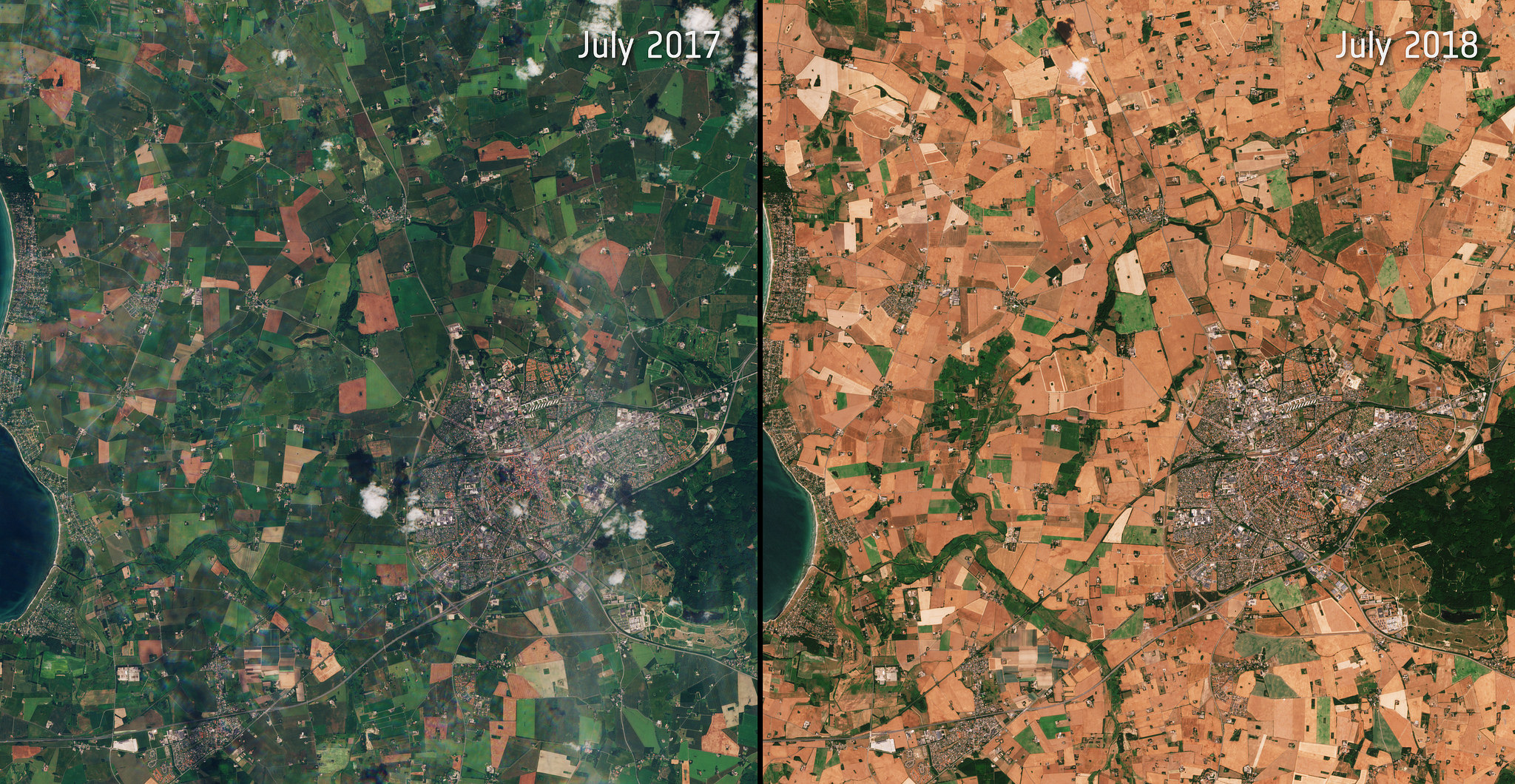
Two under-reported announcements were made during the summer by the EU Commission, to ease the burden on farmers during the prolonged drought many areas of Europe have seen. However, these moves have annoyed some, as they involve the cancellation of policy measures supposed to help make farming more resilient and robust in the face of climate extremes. And what will happen next, once this emergency passes?
On the 16th July the EU Commission announced the cancelling of greening requirements in some countries. Following this, on the 2nd August the Commission announced earlier direct payments.
According to the first announcement: “The non-production requisite on land lying fallow for farmers under crop diversification and/or ecological focus area requirements have been lifted in eight EU member states for 2018. A severe drought significantly affected agricultural activities, especially in relation to animal feed resources, in those countries.
The European Commission has agreed to the request from Danish, Estonian, Finnish, Latvian, Lithuanian, Polish, Portuguese and Swedish authorities for a temporary derogation from crop diversification and ecological focus areas rules – two of the so-called greening requirements that member states can choose to place on farmers in order to receive their direct payment.”
In the case of Poland, low rainfall and low temperatures were blamed, while for the other countries unusually high temperatures were singled out as the cause. For the latter, the temperatures impacted on the plant’s growth cycle, causing premature development or far slower development. Nutritional value and other sources of animal feed were also cited as issues by the Commission, though presumably lower yield was also a consideration.
The statement added:
“By lifting the non-production requirements and allowing cutting and grazing in those areas, the land lying fallow can become a potential source of feed.
Member states can choose whether to apply the derogations to crop diversification or to ecological focus areas, or both. In addition, the dispensation will be granted to farmers established in areas officially recognised by member states as affected by the drought. These farmers also need to be in areas where livestock is located.”
Following this, the 2nd August statement primarily announced earlier money for farmers: “farmers will be able to receive up to 70% (up from 50%) of their direct payment and 85% (up from 75%) of payments under rural development already as of mid-October 2018 instead of waiting until December to improve their cash flow situation.”
Analysis
The Commission was in something of a bind. On the one hand, the prolonged drought has put farmers under more pressure than usual. This climate-related crisis comes after a sequence of weather extremes and crises in general. With the kinds of problems listed above, letting farmers ‘off the hook’ is understandable.
On the other hand, these measures that have been cancelled are the very measures that are supposed to make farming more robust and resilient to climate shocks, and to help with long term sustainability, for soil, for pollinators and more.
Its worth remembering in all of this that farming contributes to the climate change that is amplifying these extreme weather events, and the rise in global temperatures.
It is a cruel irony that the very things that could help are essentially turned off. Moreover – and this is crucial – there is no talk, or even consideration given to, the strengthening of these measures when the drought ends. In other words, after these emergency measures, how will in particular EFAs be allowed to recuperate or regenerate? Where is the talk of adjusting the weighting of EFA measures to make up for the impact of the loss of EFAs now?
Continuously, in the CAP reform and even after, the weighting for environmentally sound EFA behaviours has been changed – and changed in a way that disincentives better environmental practice, as our 2014 article below shows.
‘CAP-itulation’ – EU Commission gives up further EFA criteria
This process of adjusting weighting to disincentivise better EFA measures continued even into the omnibus ( basically a mini CAP reform) of late 2017.
Both hard pressed farmers and environmentalists have been annoyed by greening measures – in a way they both agree that the measures are don’t really work. The European Count of Auditors largely agreed in their damning reports on the matter (for more see links at the end of this article, and their own website). While both performed really poorly, the crop diversification measure performed even worse than the EFA measure, the auditors found. In the case of crop diversification only 1% of land saw a change, and for EFA’s it was 5% of land that saw change. Bad and all as this performance is, its worth remembering that things could have actually gotten even worse, if the starting point was any other Commissioner other than previous Commissioner Dacian Cioloș, who genuinely seemed to get the socio-economic crisis farming and rural areas face.
Where the two sides often differ is in what to do about how ineffectual greening is. Environmentalists and agroecological farmers want stronger, more significant and impactful greening measures – in simple terms, to make them actually work. For example, crop rotations would build soil organic matters far more than crop diversification. And improved weighting for more impactful measures in EFAs would help pollinators, which would help tillage farmers and horticulturalists, in the long run. This is how CAP reform was supposed to be, back in the early part of this decade, when it was first mooted by Cioloș.
See here for a comprehensive summary of what happened to EFAs during the CAP reform process:
In a content of ecological collapse and possible runaway climate change, its quite the act to kill greening with death by a thousand cuts and then to say – look it doesn’t work, let’s get rid of it.
Instead of this slow death, the exact opposite needs to happen. Far more robust measures and practices need to be brought in to help deal with climate extremes and environmental collapse. These extremes are rapidly becoming normal. Risk insurance will merely increase costs and embed bad practices. Cash bail outs and rule opt outs will disillusion the European citizen. And then what?
Meanwhile, farming systems that focus on building soil organic matter via agroecological practices should be encouraged. Agroforestry, mixed species swards, and the use of biochar are three techniques in particular that shows much promise, both for climate mitigation and adaptation. These, and agroecological approaches in general, need to be brought front and centre in the years ahead.
More from ARC2020 on Greening
ECA report & 5 Member States Disrupt Commission’s Cosy CAP Communication Plans
Ecological Focus Area (EFA) in Germany: good for biodiversity & the tax payer?
Other Press
Calls for farm support intensify as Europe struggles with heat wave, drought (31th July)
Crop failure and bankruptcy threaten farmers as drought grips Europe (20th July)
Denmark’s farmers fear huge drought losses (6th June)
Calls made for less intensive livestock farmers to up silage production to avoid national fodder crisis (24th July)
QUOTE: “The most pressing thing is to grow this stuff in the country and we have to be pushing that. Six to eight million tonnes of fresh feed is needed and no transport subsidy will look after that, there’s not enough boats on the continent to import it,” Mr Patton pointed out.
INHFA’s Vincent Roddy cautioned that many extensive farms are in GLAS which means there is restrictions on the fertiliser they can spread and that this would have to be examined first and foremost.”
Northern Europe’s farmers struggle to weather extreme drought (19th July)
On Twitter
(including ourselves in an animated discussion in the first tweet!)





